10 Amazing Health Benefits Of Molokhia
Sleep like a baby and pass bowels without discomfort with this vitamin-enriched superfood.
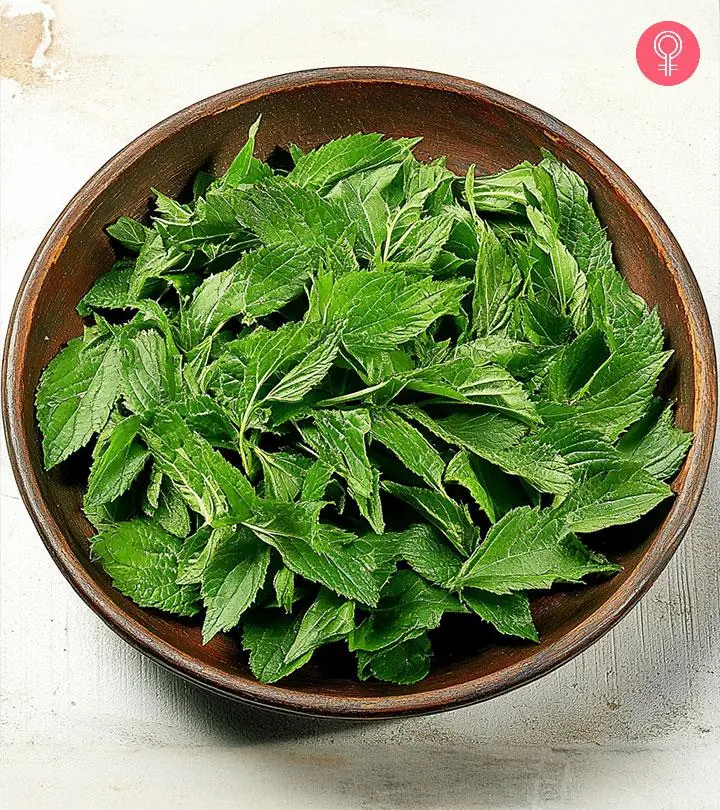
Image: Midjourney/ StyleCraze Design Team
If you are looking for a one-stop solution to all your health issues, go for molokhia. Native to Egypt, molokhia benefits your health in more ways than you are aware of. Commonly used as an ingredient in broths and curries, molokhia is rich in vitamins and minerals, making it a must-have ingredient in your pantry. This article will explore its nutritional values, health benefits, and ways to incorporate molokhia into your meals. Read on to find out!
 Know Your Ingredient: Molokhia
Know Your Ingredient: MolokhiaWhat Is It?
A vitamin-rich leafy green vegetable commonly used in broths and curries.
What Are Its Benefits?
Improves blood circulation, lowers blood pressure, aids digestion, relieves insomnia, and boosts immune function.
Who Can Consume It?
People with high blood pressure, anemia, poor immunity, and sleep issues.
How Often?
Add it to your regular diet in moderation to reap its maximum benefits.
Caution
There are no documented side effects of molokhia.
Nutritional Information
Molokhia is full of important nutrients like vitamins A and C, along with calcium, iron, and fiber.
Here is a simplified breakdown of the nutritional information of 100 g of molokhia (1):
Energy: 10 kcal
Protein: 1 g
Total Fat: 0 g
Carbohydrates: 2 g
Dietary Fiber: 2 g
Total Sugars: 0 g
Calcium: 20 mg
Iron: 1.26 mg
Sodium: 10 mg
Vitamin C: 4.8 mg
Vitamin A: 200 IU
Saturated Fat: 0 g
Trans Fat: 0 g
Cholesterol: 0 mg
These nutrients make it a beneficial ingredient for your health. Check out the next section to learn more about its health benefits.
Key Takeaways
- Molokhia is a leafy green vegetable that offers several benefits like improved digestion, managing insomnia, and increased immunity.
- The potassium in molokhia acts as a vasodilator that relaxes the arteries and reduces cardiovascular stress.
- The iron content in the vegetable increases RBC production to improve blood circulation.
- The high antioxidant content of molokhia may help combat harmful free radicals and inhibit the spread of the tumor and cancerous cells.
Health Benefits Of Molokhia – Top 10:
1. Lowers Blood Pressure

Molokhia leaves have been found to reduce the risk of hypertension, by effectively helping reduce blood pressure. Molokhia leaves are rich in potassium, and since potassium is a known vasodilator, it helps relax the arteries. This property of potassium helps improve oxygenation and reduces cardiovascular straini The distortion of the cardiac wall or chamber from a relaxed to a contracted position leading to various cardiovascular issues. (2).
2. Improves Circulation
Molokhia leaves are rich in iron, which not only increases RBC production, but also leads to improved blood circulation. Iron is needed for the blood to carry oxygen and a deficiency in iron usually results in anemia. An iron-rich diet ensures that blood circulation is at the optimal level, which in turn helps you stay energetic (3).
3. Aids Digestion

Molokhia leaves are rich in dietary fiber, and this makes them especially good for your digestive health. This fiber helps in staying full for a longer time and may help in weight loss. Dietary fiber is a bulking agent which helps relieve irritable conditions like bloating and constipation (4).
 Fun Fact
Fun Fact4. Lowers Cholesterol
Molokhia leaves have been proven to reduce blood pressure, and they are especially rich in dietary fiber. This makes them one of the best agents for cholesterol reduction and in improving heart health. Dietary fiber has been found to help reduce bad (LDL) cholesterol and fats, which directly reduces the risk of you contracting arterial diseases like stroke, heart attack or even atherosclerosisi The hardening and narrowing of the artery walls due to the build-up of fats and cholesterol, leading to heart attack or stroke. (5).‘
5. Relieves Insomnia

Molokhia is rich in many essential minerals, most notably magnesium. Magnesium has been proved to help eliminate sleep disorders like insomnia and even snoring disorders like apneai A common sleeping condition where a person’s breathing stops and restarts many times while asleep. . Magnesium triggers the release of hormones that relax the body and calm the nerves. An increase in magnesium intake has been directly linked with regular and better sleep cycles (6).
6. Boosts Immunity

Molokhia leaves are rich in vitamins A, C and E, omega-3 fatty acids, and amino acids. It is especially effective for the immune system. Vitamin C is one of the most effective antioxidants that not only eliminates free radicals, but also helps instigate WBC production (7). WBCs usually attack pathogens and infections first. Vitamins A and E are antioxidant vitamins that prevent free radical damage. The consumption of Molokhia leaves helps boost immunity.
 Fun Fact
Fun Fact7. Anti-Carcinogenic
Along with other essential minerals and nutrients, molokhia is rich in antioxidant vitamins A, C and E (8), (9). Antioxidants usually help protect the body from cancer-inducing free radicals and restrict the spread of cancerous cells and tumors. The high antioxidant content of molokhia leaves makes it an ideal anti-carcinogen.
8. Boosts Bone Health

Molokhia is loaded with essential vitamins and minerals that have many health benefits. Some of these have been found to boost bone health and protect one against diseases like osteoporosis and arthritic conditions. Iron, selenium, calcium magnesium, zinc, manganese, and phosphorus are just some of the essential minerals that molokhia leaves contain (10), (11).
9. Anti-Inflammatory
In traditional medicine, Molokhia leaves have been used extensively as anti-inflammation agents. One of the constituent antioxidants that make up molokhia is Vitamin E, an especially effective anti-inflammatory agent that usually cures and treats most symptoms of inflammation. If you suffer from rheumatoid arthritis, cystitisi The inflammation of the bladder that occurs when the bladder is irritated or damaged due to an infection. or other inflammatory conditions, consider adding molokhia leaves to your diet (12).
10. Cellular Growth
Molokhia leaves contain many essential nutrients and minerals that not only aid in the proper functioning of the body, but also help create new cells, skin, ligaments, muscles and organ systems. As molokhia is especially rich in magnesium, it is a great food that boosts cellular growth. Magnesium helps build new organic material and is necessary for proper cell growth (13).
You can enjoy the many benefits of molokhia by incorporating it into your regular diet. Read on to know more about it.
Culinary Uses of Molokhia
Molokhia is a versatile ingredient that works well in many tasty dishes like soups, stews, and salads. Its unique flavor complements a wide range of foods, enhancing your meals in different ways. For example, it is often used in traditional Egyptian recipes, such as molokhia soup, and can be served over rice for a satisfying and nutritious meal.
To incorporate molokhia into your daily diet, consider adding it to vegetable soups for extra flavor and nutrients, mixing it into grain-based salads for a nutrient boost, or using it as a savory filling in wraps and sandwiches. Its versatility allows you to enjoy its health benefits in many different ways.
Molokhia Recipe
Lebanese Molokhia
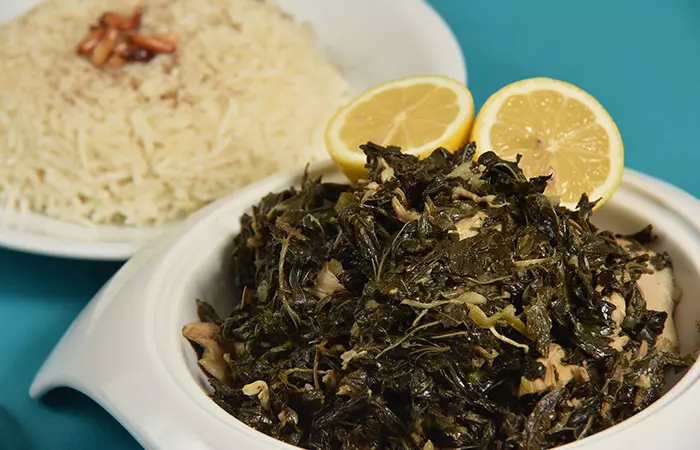
Ingredients
- 2 cups of dried, clean molokhia leaves
- 4 cups of chicken broth
- 1 pound of chicken, cooked and shredded
- 1 onion, finely chopped
- 3 garlic cloves, minced
- 1/4 cup of fresh cilantro, chopped
- 1/4 cup of olive oil
- 2 bay leaves
- 2 cinnamon sticks
- 1 teaspoon of ground coriander
- Salt and pepper, to taste
- Juice from 1 lemon, for garnish
Instructions
- Rinse the molokhia leaves thoroughly under running water.
- Add the chicken, bay leaves, cinnamon sticks, chopped onions, and water to a large pot. Bring the mixture to a boil and let it simmer until the chicken is fully cooked.
- Strain the broth and set it aside.
- Heat the olive oil over medium heat. Add the minced garlic, onions, and chopped cilantro, and sauté until fragrant.
- Add the cleaned molokhia leaves, sprinkle some ground coriander, and sauté until well combined.
- Pour the chicken broth, cover the pot, and let it simmer.
- Add the shredded chicken and lemon juice to the thickened broth.
- Serve this with rice or pita bread.
Infographic: 5 Amazing Health Benefits Of Molokhia
As you read above, broths and curries frequently contain Molokhia which contains leaves that are rich in vitamins A, C, and E. These anti-inflammation agents have great nutritional value. To see some of the advantages, check out the infographic given below. Illustration: StyleCraze Design Team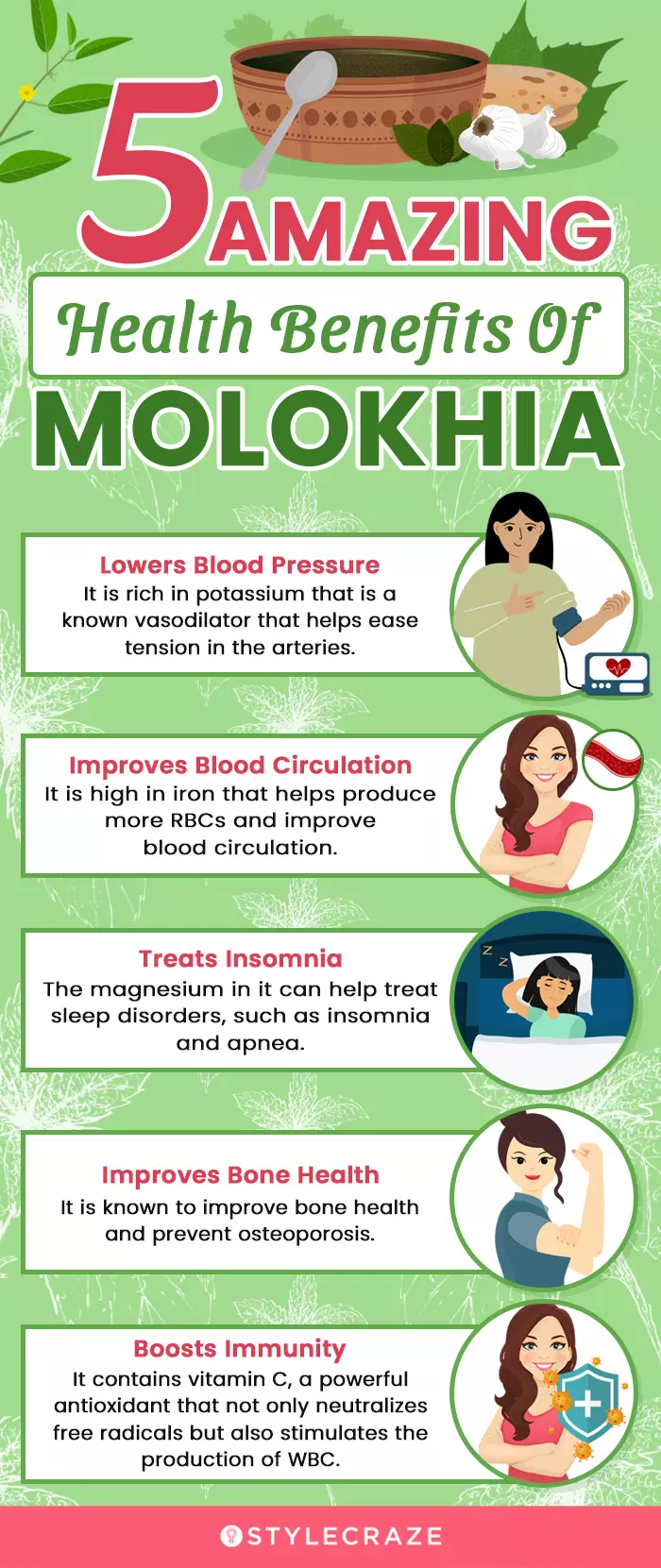
The benefits of molokhia can be attributed to its many vitamins and minerals, carotenoids, and antioxidants. The intake of molokhia may lower blood pressure levels, improve circulation, aid in digestion, lower cholesterol, relieve insomnia, boost immune health, and even help in cancer prevention. While there are no documented side effects, it is recommended to consume molokhia in moderation to reap its maximum benefits.
Frequently Asked Questions
What is the best way to prepare molokhia for maximum health benefits?
To get the most health benefits from molokhia, it is best to steam or lightly sauté it to preserve its nutrients. Do not overcook as it can reduce its nutritional value.
Is molokhia good for kidneys?
Yes, molokhia has antioxidant and antitumor properties that may protect your kidneys from cancer and lead poisoning (14).
Is molokhia the same as spinach?
No, molokhia is a different green leafy vegetable. However, due to its similarity to spinach, it is often referred to as Egyptian spinach.
Does molokhia have protein?
Yes, molokhia is a good source of protein and contains 4.5-5.6 g of protein per 100g of fresh leaves (15).
What is the English name for molokhia?
Molokhia is commonly known as tossa jute, nalta jute, jute mallow, jute leaves, or Jew’s Mallow in English.
Is molokhia a superfood?
Yes. Molokhia is packed with nutrition. It has nutrients like vitamins and fiber that benefit your health in various ways.
Is molokhia easy to digest?
Yes. Molokhia is rich in dietary fiber, making it easier to digest and excellent for maintaining digestive health.
Is molokhia keto-friendly?
Yes. Molokhia is keto-friendly and low in calories.
Can molokhia be eaten raw?
Yes. The molokhia leaves can be eaten raw in salads, cooked as a side dish, or prepared into soup.
Illustration: Amazing Health Benefits Of Molokhia
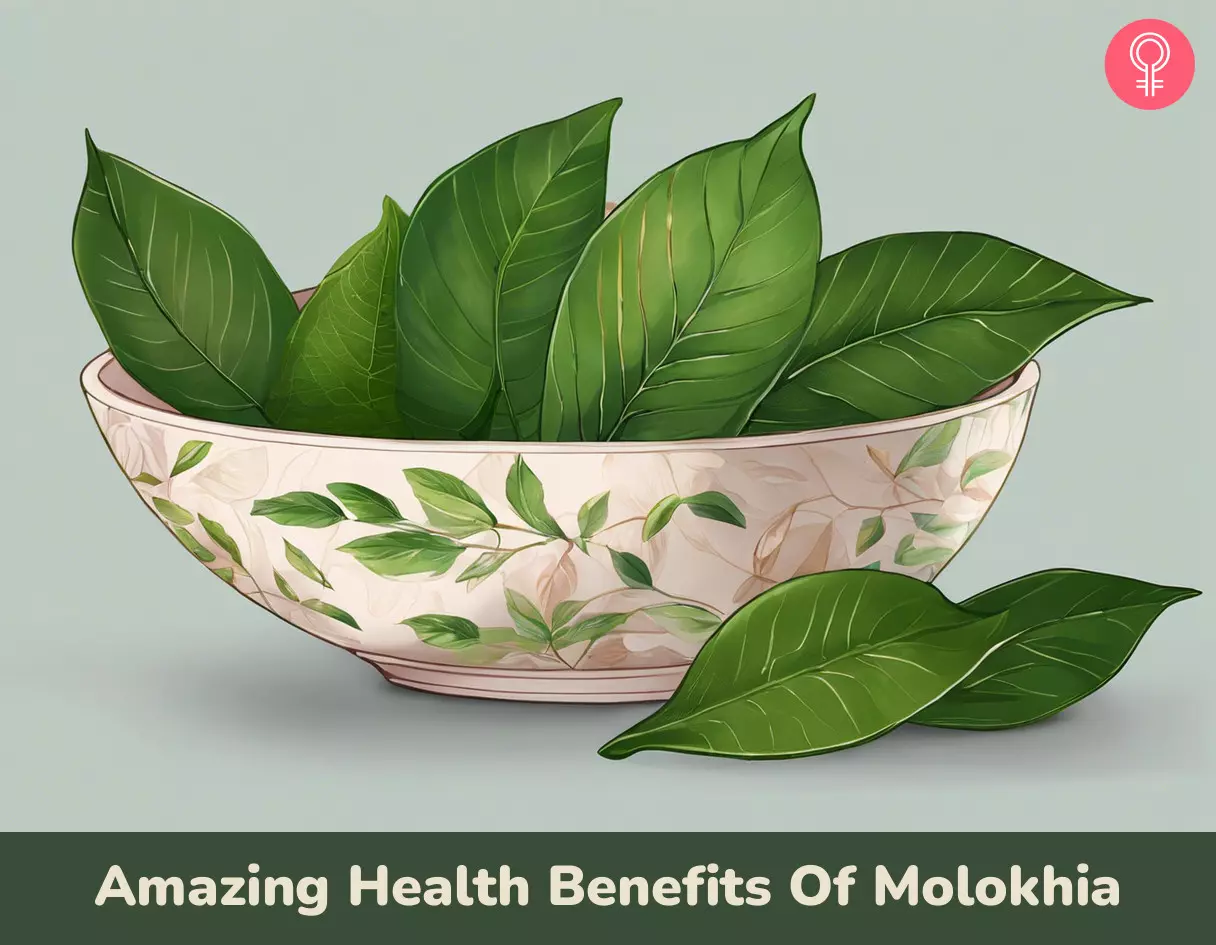
Image: Stable Diffusion/StyleCraze Design Team
Watch this video to know about molokhia leaf, a superfood packed with amazing benefits that can help improve your overall health and well-being.
References
Articles on StyleCraze are backed by verified information from peer-reviewed and academic research papers, reputed organizations, research institutions, and medical associations to ensure accuracy and relevance. Read our editorial policy to learn more.
- Molokhiya leaves
https://fdc.nal.usda.gov/fdc-app.html#/food-details/2089410/nutrients - Role of potassium in regulating blood flow and blood pressure
https://pubmed.ncbi.nlm.nih.gov/16467502/ - Iron deficiency anemia
https://medlineplus.gov/ency/article/000584.htm - Fiber
https://medlineplus.gov/ency/article/002470.htm - Cholesterol-lowering effects of dietary fiber: a meta-analysis
https://pubmed.ncbi.nlm.nih.gov/9925120/ - The effect of magnesium supplementation on primary insomnia in elderly: A double-blind placebo-controlled clinical trial
https://pubmed.ncbi.nlm.nih.gov/23853635/ - Immune-enhancing role of vitamin C and zinc and effect on clinical conditions
https://pubmed.ncbi.nlm.nih.gov/16373990/ - [Anti-carcinogenic and anti-blastic effect of vitamin A in various modes of its administration to random-bred rats during carcinogenesis of the mammary gland, induced by 7,12-dimethylbenz(a)anthracene]
https://pubmed.ncbi.nlm.nih.gov/2507271/ - Vitamin C and cancer chemoprevention: reappraisal
https://pubmed.ncbi.nlm.nih.gov/14668266/ - Calcium and bones
https://medlineplus.gov/ency/article/002062.htm - Magnesium and Osteoporosis: Current State of Knowledge and Future Research Directions
https://www.ncbi.nlm.nih.gov/pmc/articles/PMC3775240/ - Vitamin E has a dual effect of anti-inflammatory and antioxidant activities in acetic acid-induced ulcerative colitis in rats
https://pubmed.ncbi.nlm.nih.gov/21933527/ - Effects of magnesium on growth and proliferation of human embryonic stem cells
https://pubmed.ncbi.nlm.nih.gov/23365994/ - Nutritional Composition of Molokhia (Corchorus olitorius) and Stamnagathi (Cichorium spinosum)
https://www.researchgate.net/publication/10760032_Nutritional_Composition_of_Molokhia_Corchorus_olitorius_and_Stamnagathi_Cichorium_spinosumi - Chopped molokhia
https://fdc.nal.usda.gov/fdc-app.html#/food-details/451595/nutrients - The Effect Of Feeding With Molokhia (C. Olitorius) Leaves Powder On Lead Poisoning Rats.
https://journals.ekb.eg/article_165078_672a5aa5b68a8363825bc1ba66cddfa5.pdf - Corchorus olitorius L.
https://www.hort.purdue.edu/newcrop/duke_energy/Corchorus_olitorius.html
Read full bio of Eva De Angelis
Read full bio of Tanya Choudhary
Read full bio of Ravi Teja Tadimalla
Read full bio of Moksha Gandhi




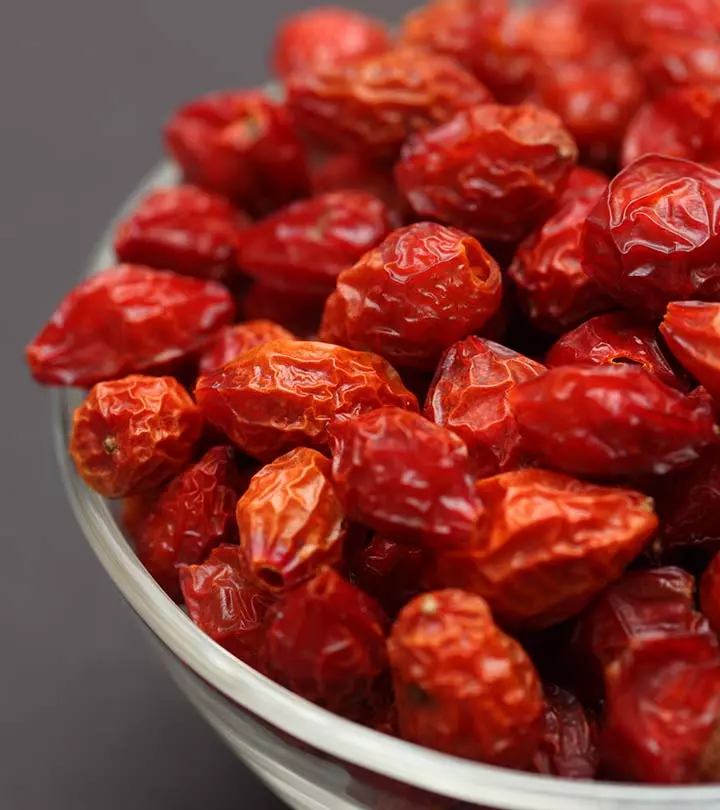
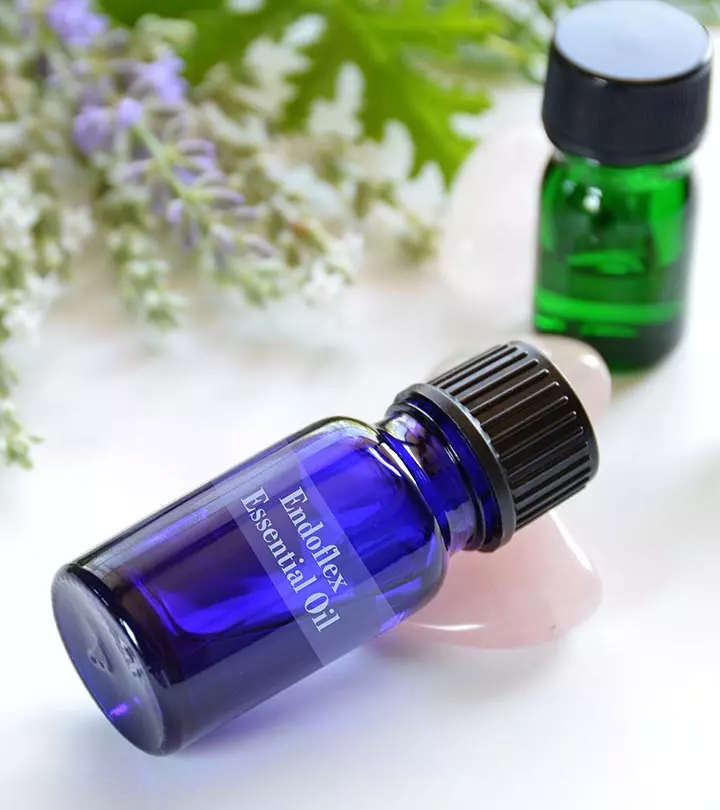
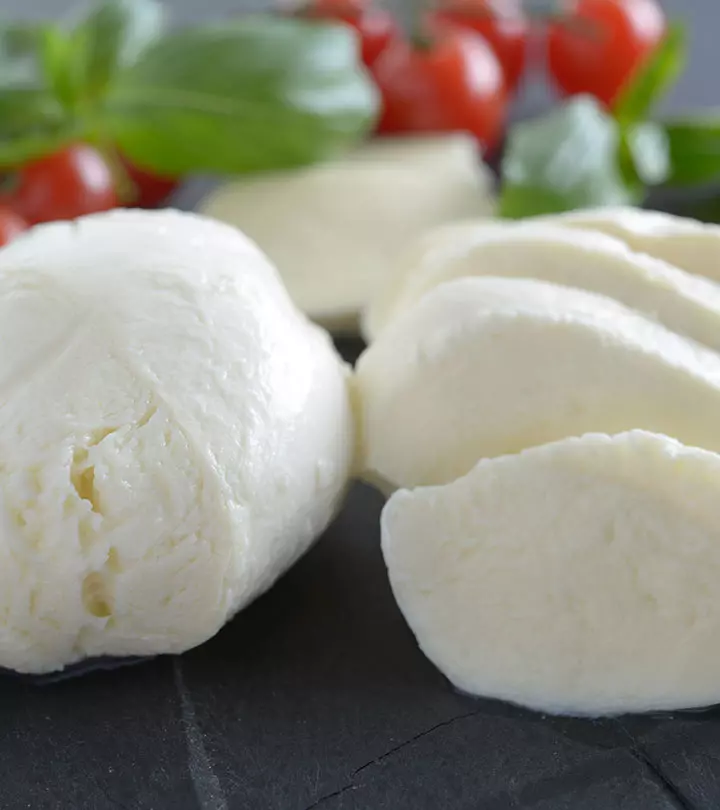
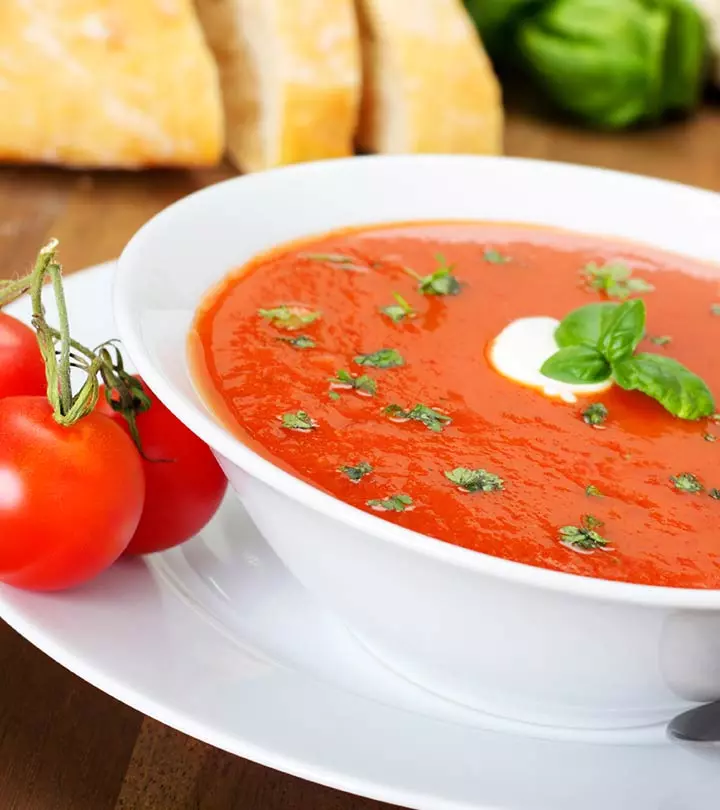
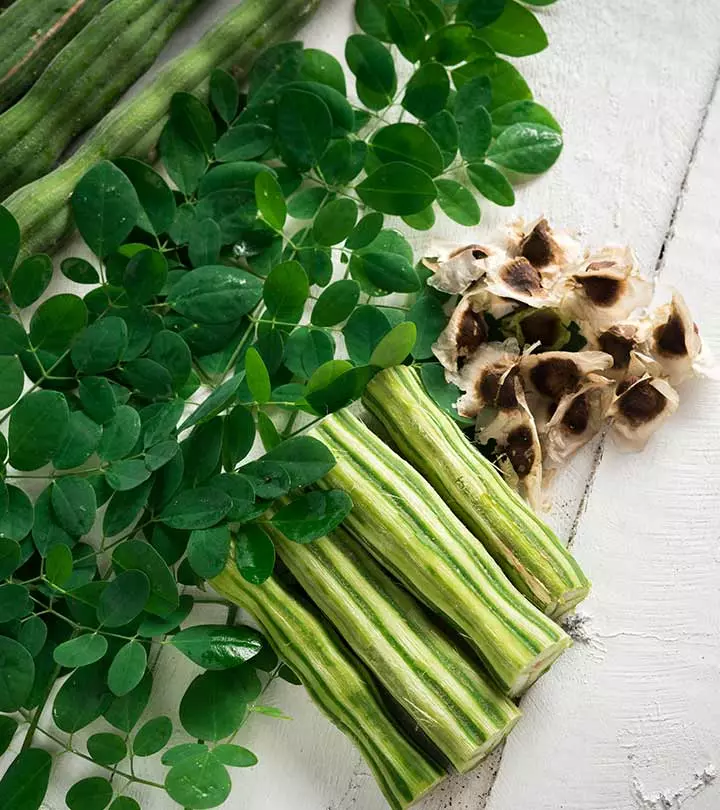
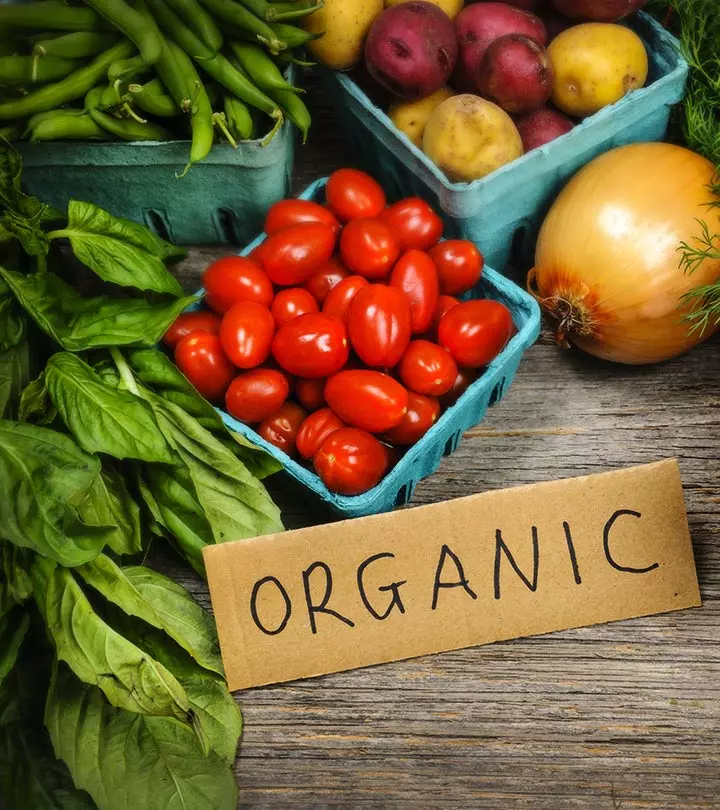
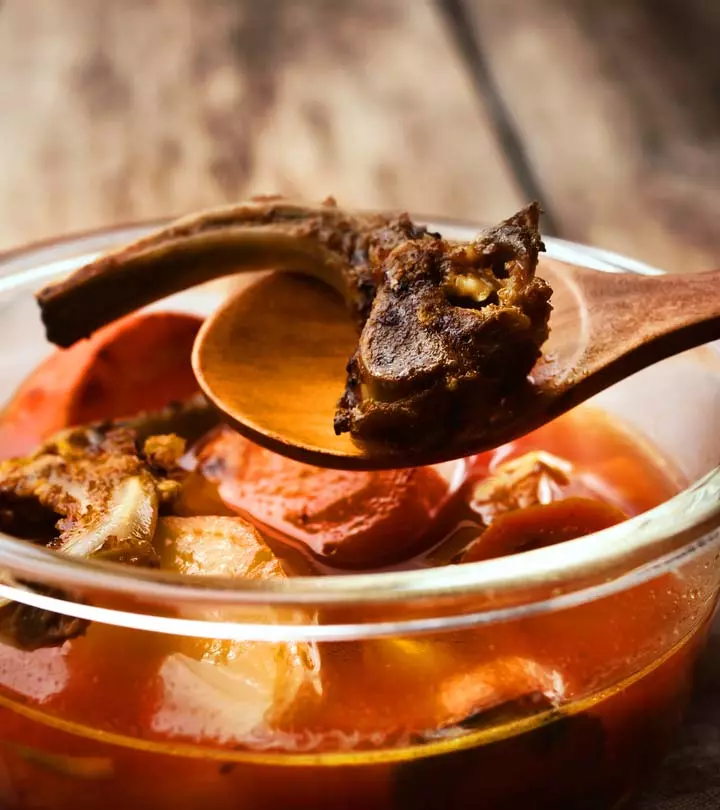
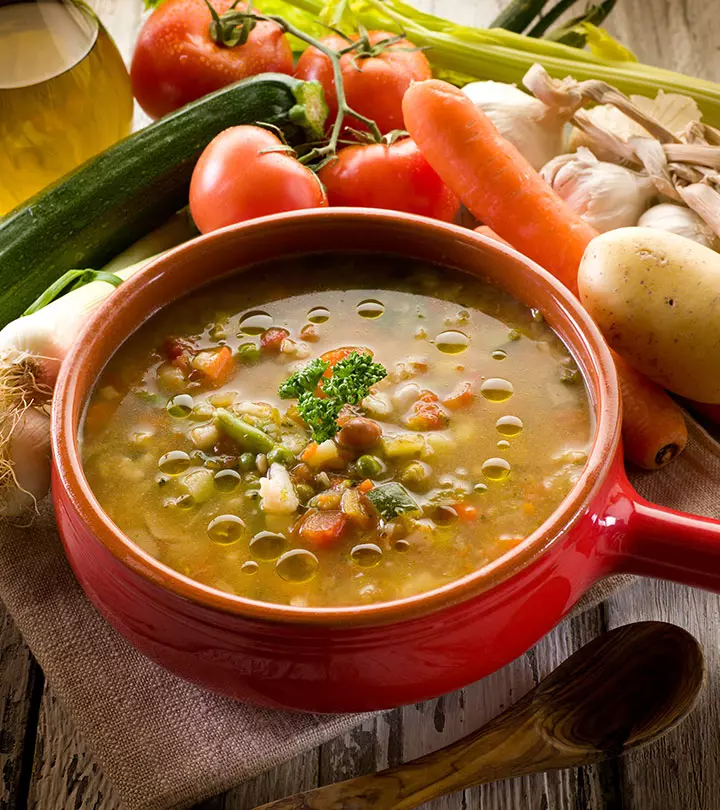


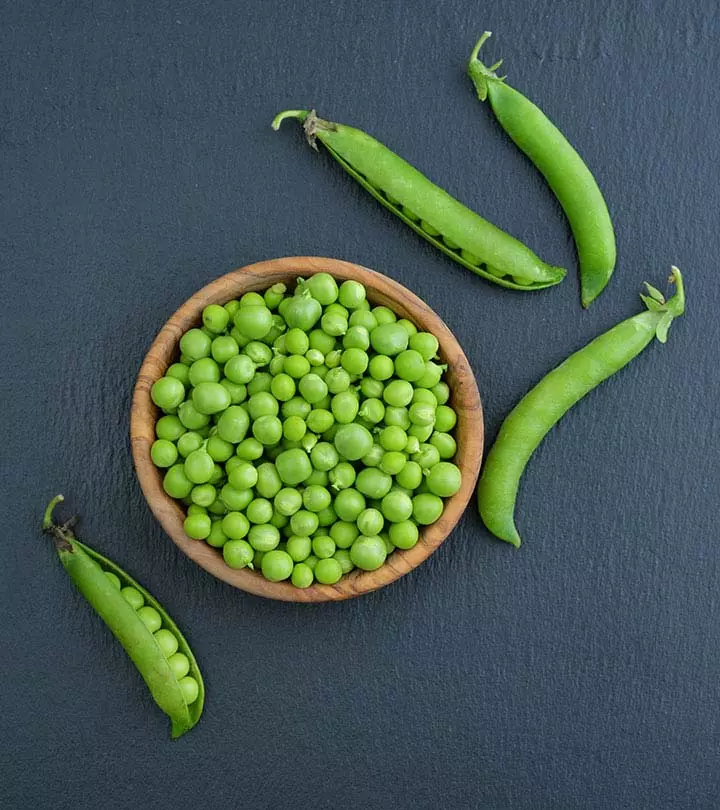
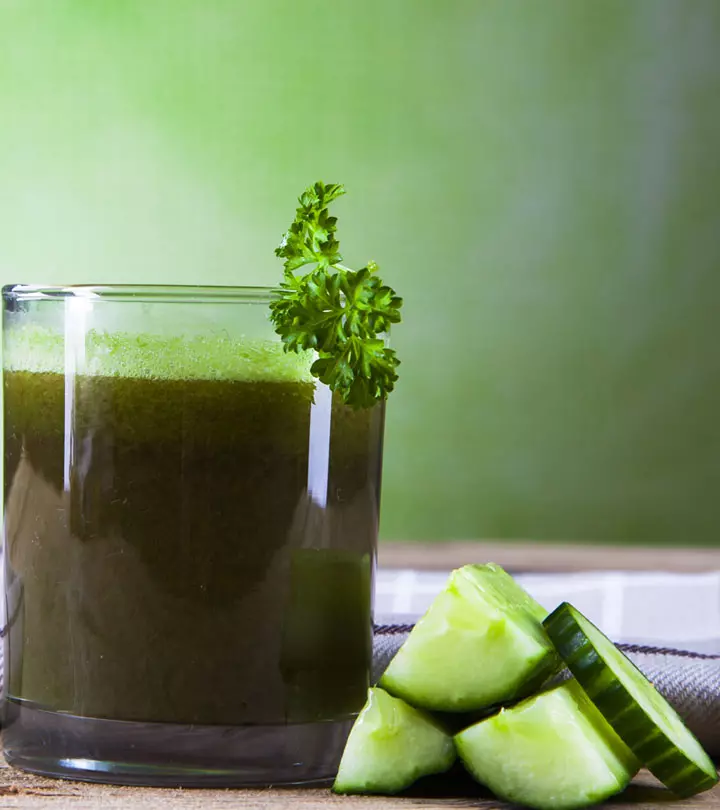
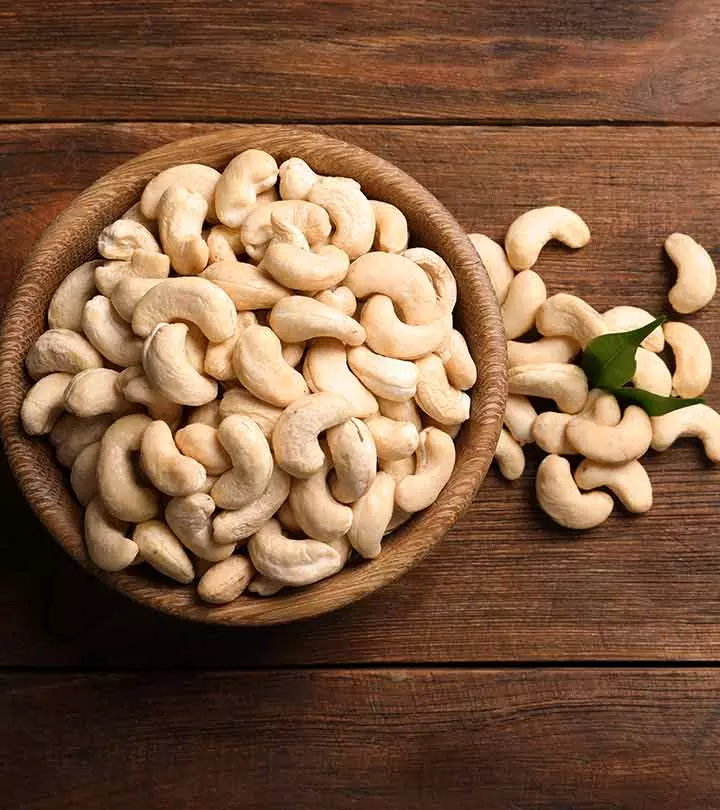

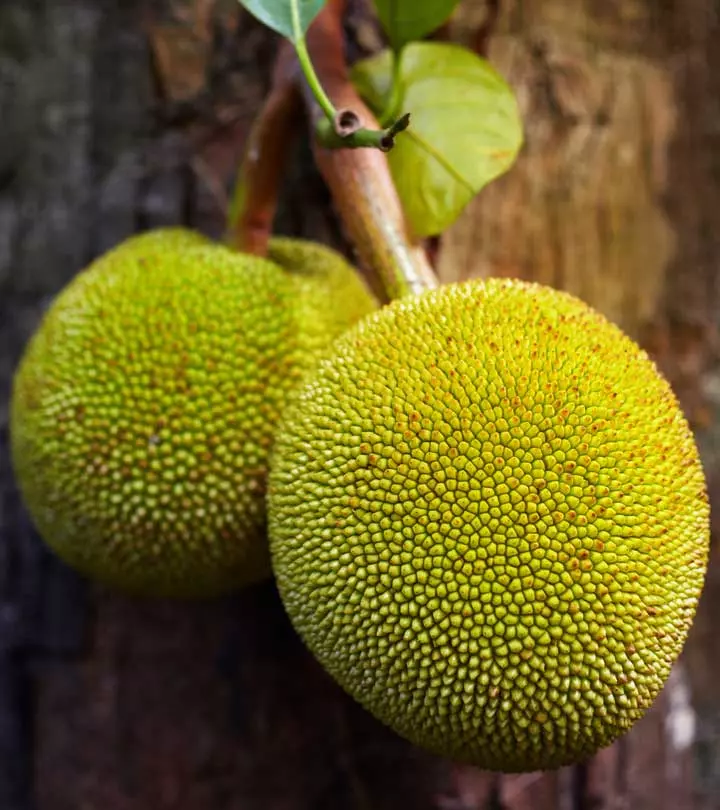
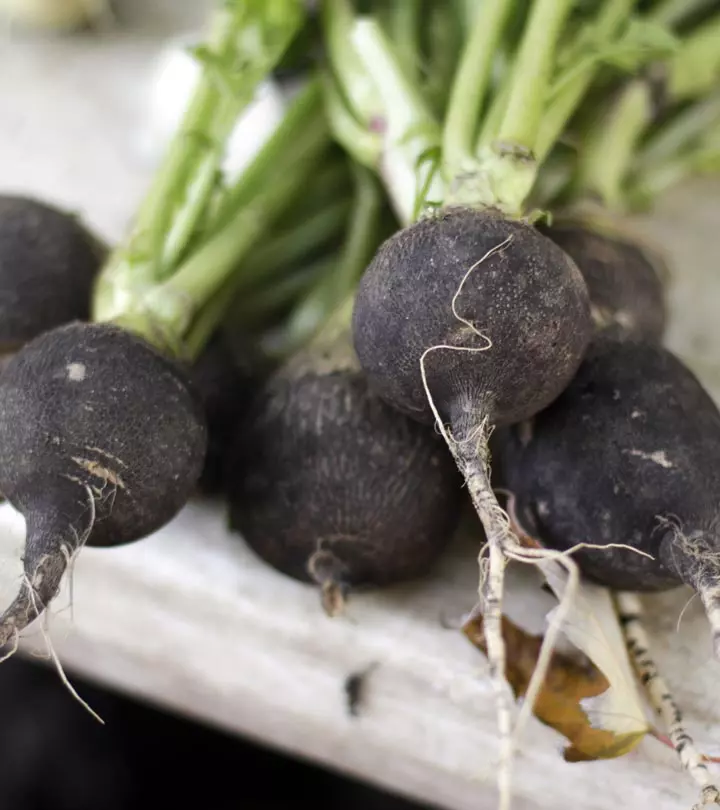
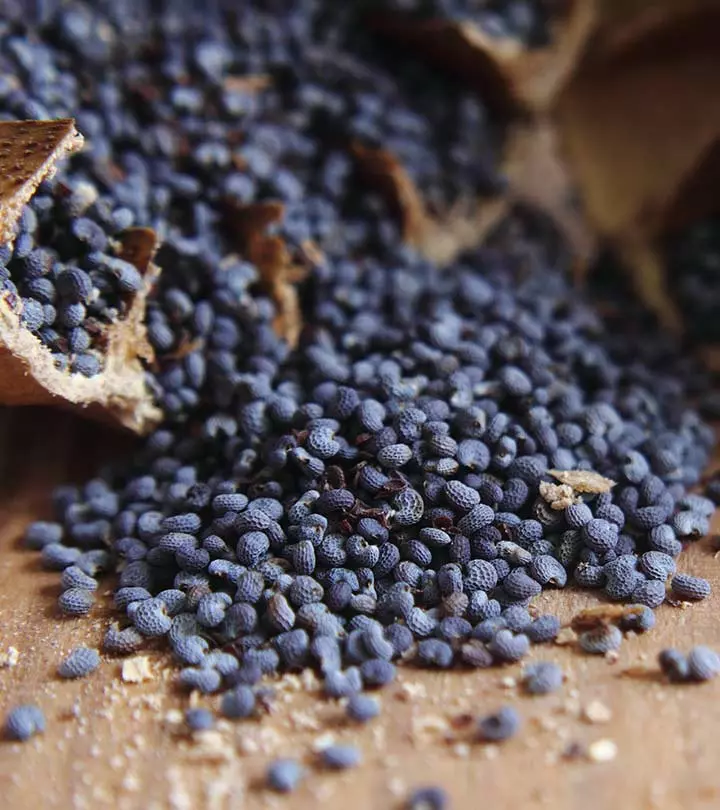
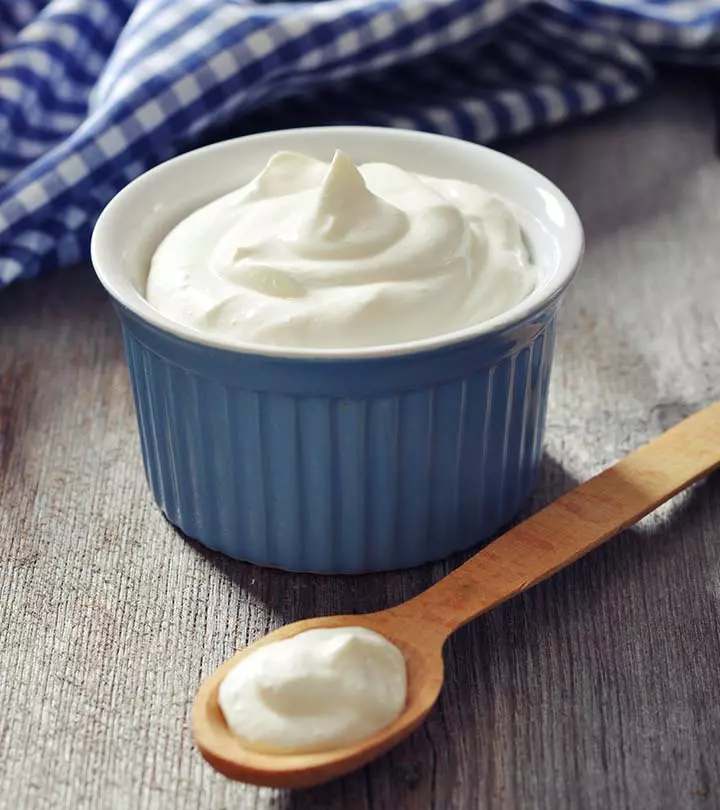
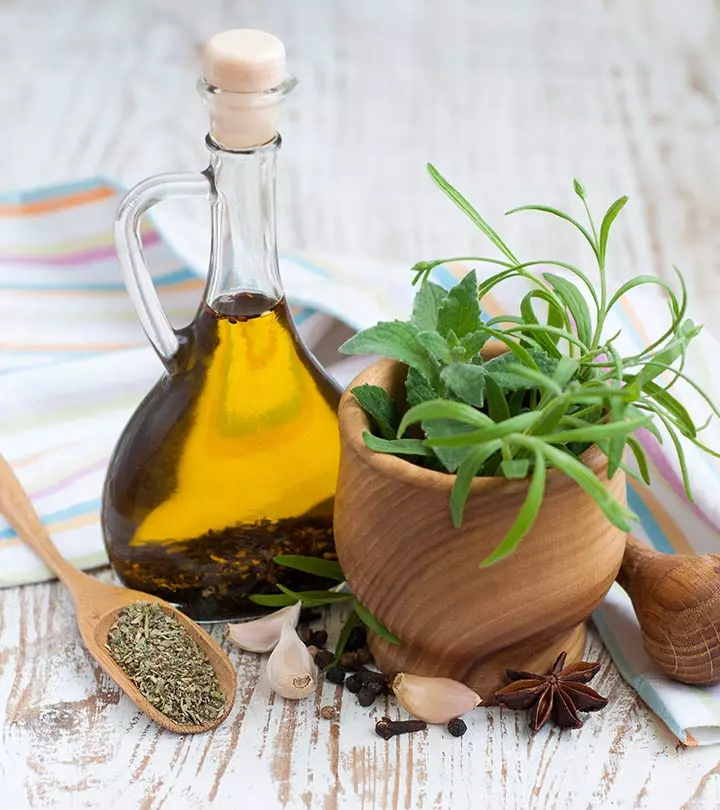

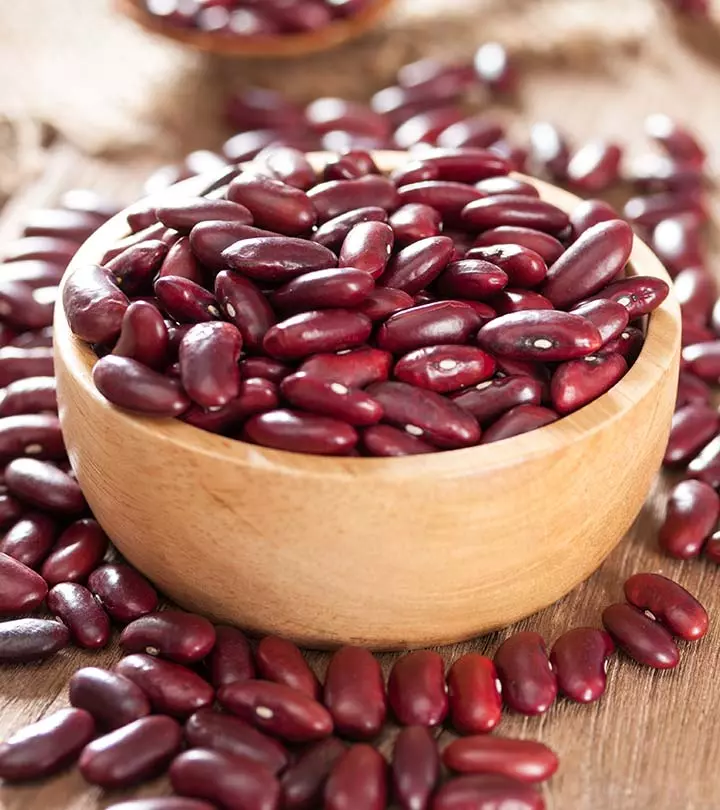
Community Experiences
Join the conversation and become a part of our empowering community! Share your stories, experiences, and insights to connect with other beauty, lifestyle, and health enthusiasts.